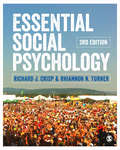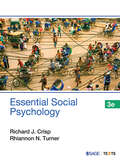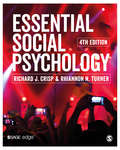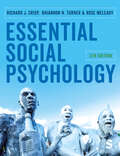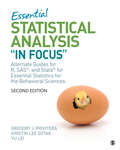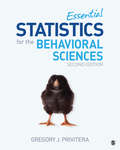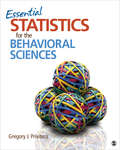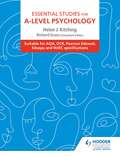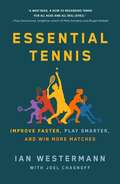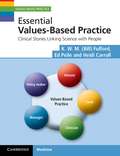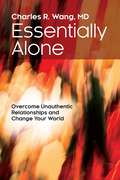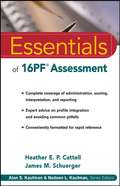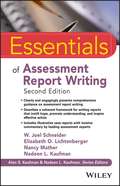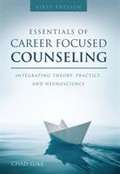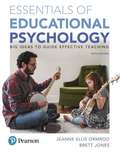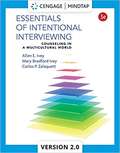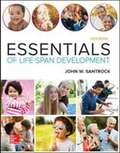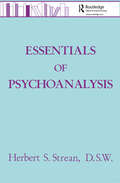- Table View
- List View
Essential Social Psychology
by Richard J. Crisp Professor Rhiannon TurnerFrom aggression to altruism, prejudice to persuasion, Essential Social Psychology 3e introduces students to the discoveries and debates that define social psychology today. It covers both classic and cutting edge research studies and provides plenty of real life examples and illustrations to help students to develop a good understanding of the subject whilst building the confidence to apply this knowledge successfully in assignments and exams. An extensive range of learning aids including a glossary, summary sections and memory maps – combined with an array of features on the student section of the companion website – will help reinforce this learning and check retention at specific milestones throughout the course. New to the third edition: A new full-colour design Two brand new chapters on Applied Social Psychology and Social Psychological Methods Coverage of some developing research perspectives including social neuroscience and evolutionary psychology New ‘Back to the Real World’ textboxes which situate academic findings in the context of the world around you An enhanced SAGE edge™ companion website (study.sagepub.com/crispandturner3e) with a suite of features to enhance your learning experience.
Essential Social Psychology
by Richard J. Crisp Rhiannon N. TurnerThis second edition of an introductory text for undergraduates contains two new chapters, new debates at the end of each chapter, and more contemporary research and examples. The text is written in an accessible, conversational style with a sense of humor and features short chapters in a simple but reader-friendly two-color layout. Coverage encompasses classic and contemporary studies, with chapters on topics such as social cognition, group processes, prosocial behavior, affiliation and attraction, and friendship and love. Learning features include chapter-ending memory maps (graphic concept organizers), boxed readings, within-chapter summary boxes, and large color headings and subheadings. Each chapter also provides individual and group thought exercises and discussion topics, plus annotated lists of further reading. A companion web site contains quizzes, flashcards, and blank memory maps. Instructors can access lecture slides, a test bank, and animated memory maps online. Crisp teaches psychology at the University of Kent. Turner teaches social psychology at the University of Leeds. Annotation ©2012 Book News, Inc. , Portland, OR (booknews. com)
Essential Social Psychology
by Richard J. Crisp Rhiannon N. TurnerHelps readers build a strong groundwork through easy and accessible discussion on essential theories and research in social psychology. The third edition to this well-acclaimed textbook offers a lively introduction to the major theoretical debates, new approaches, and findings in the discipline. The concise yet well-rounded chapters cover the classic and contemporary studies incorporating a range of approaches - from evolution to neuroscience, from critical to qualitative perspectives. By thoroughly integrating latest research from the field, Essential Social Psychology encourages readers to develop critical insights to the topics and identify their application to real-world issues. Feature Highlights Dedicated chapters on Applied Social Psychology and Social Psychological Methods Coverage of developing research perspectives on social neuroscience and evolutionary psychology 'Back to the Real World' textboxes to situate academic findings in the context of the real world Extensive range of learning aids - cases and examples, summary sections, memory maps, assignments, and so on.
Essential Social Psychology
by Richard J. Crisp Rhiannon TurnerFrom aggression to altruism, prejudice to persuasion, Essential Social Psychology 4e introduces students to the classic studies, the controversial debates and innovative research that define social psychology today. It gives students what they need to know about the key areas of social psychology whilst also demonstrating its relevance to current, real world events. New to this edition: Coverage of social neuroscience Inclusion of evolutionary psychology &‘Back to the Real World&’ boxes which situate academic findings in the real life context of the world around you Online there are resources for students which create a complete learning experience to help students build confidence and apply their knowledge successfully in assignments and exams. You'll also find teaching materials to help every week which can be easily incorporated into your VLE.
Essential Social Psychology
by Richard J. Crisp Rhiannon TurnerFrom aggression to altruism, prejudice to persuasion, Essential Social Psychology 4e introduces students to the classic studies, the controversial debates and innovative research that define social psychology today. It gives students what they need to know about the key areas of social psychology whilst also demonstrating its relevance to current, real world events. New to this edition: Coverage of social neuroscience Inclusion of evolutionary psychology &‘Back to the Real World&’ boxes which situate academic findings in the real life context of the world around you Online there are resources for students which create a complete learning experience to help students build confidence and apply their knowledge successfully in assignments and exams. You'll also find teaching materials to help every week which can be easily incorporated into your VLE.
Essential Social Psychology
by Richard J. Crisp Rhiannon Turner Rose MeleadyEssential Social Psychology introduces you to the core topics in Social Psychology, covering its history, methods, and approaches, as well as helping you grasp key topics such as social influence, group processes, prejudice, friendship, affiliation, and love. This new edition has a strong emphasis on real-world applications, for example exploring how social psychology was applied during the Covid-19 pandemic. It has been updated to include more in-depth coverage of contemporary topics such as social media, the digital world, as well as social justice topics, such as LGBTQ+ issues in psychology. This book is ideal for undergraduate students of social psychology. Richard Crisp is Professor of Social Psychology at Durham University. Rhiannon Turner is Professor of Social Psychology at Queen’s University Belfast. Rose Meleady is an Associate Professor in Psychology at the University of East Anglia.
Essential Social Psychology
by Richard J. Crisp Rhiannon Turner Rose MeleadyEssential Social Psychology introduces you to the core topics in Social Psychology, covering its history, methods, and approaches, as well as helping you grasp key topics such as social influence, group processes, prejudice, friendship, affiliation, and love. This new edition has a strong emphasis on real-world applications, for example exploring how social psychology was applied during the Covid-19 pandemic. It has been updated to include more in-depth coverage of contemporary topics such as social media, the digital world, as well as social justice topics, such as LGBTQ+ issues in psychology. This book is ideal for undergraduate students of social psychology. Richard Crisp is Professor of Social Psychology at Durham University. Rhiannon Turner is Professor of Social Psychology at Queen’s University Belfast. Rose Meleady is an Associate Professor in Psychology at the University of East Anglia.
Essential Statistical Analysis "In Focus": Alternate Guides for R, SAS, and Stata for Essential Statistics for the Behavioral Sciences
by Yu Lei Kristin L. Sotak Gregory J. PriviteraEssentials of Statistical Analysis "In Focus" supports users of Gregory J. Privitera’s Essential Statistics for the Behavioral Sciences, Second Edition who work with a statistical program other than SPSS® or Excel®. Three standalone parts, each dedicated to R, SAS®, and Stata®, serve as step-by-step guides for completing the "In Focus" exercises in Privitera’s core text. A conversational writing style along with "To The Student" introductions allow students to familiarize themselves and become more comfortable with each program prior to making computations. Additionally, General Instruction Guidebook (GIG) sections for R, SAS®, and Stata® provide standardized how-to instructions for using each program, making the book a valuable reference for students beyond their studies.
Essential Statistical Analysis "In Focus": Alternate Guides for R, SAS, and Stata for Essential Statistics for the Behavioral Sciences
by Yu Lei Kristin L. Sotak Gregory J. PriviteraEssentials of Statistical Analysis "In Focus" supports users of Gregory J. Privitera’s Essential Statistics for the Behavioral Sciences, Second Edition who work with a statistical program other than SPSS® or Excel®. Three standalone parts, each dedicated to R, SAS®, and Stata®, serve as step-by-step guides for completing the "In Focus" exercises in Privitera’s core text. A conversational writing style along with "To The Student" introductions allow students to familiarize themselves and become more comfortable with each program prior to making computations. Additionally, General Instruction Guidebook (GIG) sections for R, SAS®, and Stata® provide standardized how-to instructions for using each program, making the book a valuable reference for students beyond their studies.
Essential Statistics for the Behavioral Sciences
by Gregory J. PriviteraEssentials of Statistics for the Behavioral Sciences is a concise version of Statistics for the Behavioral Sciences by award-winning teacher, author, and advisor Gregory J. Privitera. The Second Edition provides balanced coverage for today’s students, connecting the relevance of core concepts to daily life with new introductory vignettes for every chapter, while speaking to the reader as a researcher when covering statistical theory, computation, and application. Robust pedagogy allows students to continually check their comprehension and hone their skills while working through carefully developed problems and exercises that include current research and seamless integration of IBM® SPSS® Statistics. Readers will welcome Privitera’s thoughtful instruction, conversational voice, and application of statistics to real-world problems. A Complete Teaching & Learning Package. SAGE coursepacks FREE! SAGE coursepacks makes it easy to import our quality instructor and student resource content into your school’s learning management system (LMS). Intuitive and simple to use, SAGE coursepacks allows you to customize course content to meet your students’ needs. . SAGE edge FREE! SAGE edge offers both instructors and students a robust online environment with an impressive array of teaching and learning resources. Study Guide With IBM® SPSS® Workbook Bundle the Second Edition with the accompanying Student Study Guide With IBM® SPSS® Workbook for Essential Statistics for the Behavioral Sciences. Guide for Users of R, SAS®, and Stata® Bundle the Second Edition with the accompanying Essentials of Statistical Analysis "In Focus". WebAssign® This title is available on WebAssign, allowing instructors to produce and manage assignments with their students online using a grade book that allows them to track and monitor students′ progress. Students receive unlimited practice using a combination of multiple choice and algorithmic questions, and are allowed unlimited access to this edition of the textbook in the same course at no additional cost. WebAssign provides instant feedback and links directly to the accompanying eBook section where the concept was covered, allowing students to find the correct solution.
Essential Statistics for the Behavioral Sciences
by Gregory J. PriviteraEssentials of Statistics for the Behavioral Sciences is a concise version of Statistics for the Behavioral Sciences by award-winning teacher, author, and advisor Gregory J. Privitera. The Second Edition provides balanced coverage for today’s students, connecting the relevance of core concepts to daily life with new introductory vignettes for every chapter, while speaking to the reader as a researcher when covering statistical theory, computation, and application. Robust pedagogy allows students to continually check their comprehension and hone their skills while working through carefully developed problems and exercises that include current research and seamless integration of IBM® SPSS® Statistics. Readers will welcome Privitera’s thoughtful instruction, conversational voice, and application of statistics to real-world problems. A Complete Teaching & Learning Package. SAGE coursepacks FREE! SAGE coursepacks makes it easy to import our quality instructor and student resource content into your school’s learning management system (LMS). Intuitive and simple to use, SAGE coursepacks allows you to customize course content to meet your students’ needs. . SAGE edge FREE! SAGE edge offers both instructors and students a robust online environment with an impressive array of teaching and learning resources. Study Guide With IBM® SPSS® Workbook Bundle the Second Edition with the accompanying Student Study Guide With IBM® SPSS® Workbook for Essential Statistics for the Behavioral Sciences. Guide for Users of R, SAS®, and Stata® Bundle the Second Edition with the accompanying Essentials of Statistical Analysis "In Focus". WebAssign® This title is available on WebAssign, allowing instructors to produce and manage assignments with their students online using a grade book that allows them to track and monitor students′ progress. Students receive unlimited practice using a combination of multiple choice and algorithmic questions, and are allowed unlimited access to this edition of the textbook in the same course at no additional cost. WebAssign provides instant feedback and links directly to the accompanying eBook section where the concept was covered, allowing students to find the correct solution.
Essential Statistics for the Behavioral Sciences: Alternate Guides For R, Sas, And Stata For Essential Statistics For The Behavioral Sciences
by Dr Gregory J. PriviteraEmploying the hallmark pedagogical support of his successful comprehensive text, award-winning author, teacher, and advisor Gregory J. Privitera offers a brief and engaging introduction to the field with Essential Statistics for the Behavioral Sciences. Practical examples, integrated SPSS® coverage and screenshots, and numerous learning tools make intimidating concepts accessible. Students will welcome Privitera's clear instruction, conversational voice, and application of statistics to current, real-life research problems.
Essential Statistics for the Behavioral Sciences: Alternate Guides For R, Sas, And Stata For Essential Statistics For The Behavioral Sciences
by Dr Gregory J. PriviteraEmploying the hallmark pedagogical support of his successful comprehensive text, award-winning author, teacher, and advisor Gregory J. Privitera offers a brief and engaging introduction to the field with Essential Statistics for the Behavioral Sciences. Practical examples, integrated SPSS® coverage and screenshots, and numerous learning tools make intimidating concepts accessible. Students will welcome Privitera's clear instruction, conversational voice, and application of statistics to current, real-life research problems.
Essential Studies for A-Level Psychology
by Helen J. KitchingUnderstand and evaluate 42 classic and contemporary psychological studies, including Milgram and Rutter, with this essential guide.Each study begins with a summary of the aims and procedure, followed by the findings, conclusion and evaluation, and ends with 'check your knowledge' questions that help to prepare students for assessment.- Build knowledge with easily accessible summaries of each study presented in a table, making it quick and easy to recap and revise- Develop analysis, interpretation and evaluation skills with examples, insights and practice questions that help students to form reasoned conclusions- Learn to apply knowledge and think synoptically with links to other studies; these also demonstrate learning beyond the curriculum in line with Ofsted requirements- Benefit from the guidance of bestselling Psychology author Richard Gross, with helpful insights at the end of each chapter- Cover every research/core study for the AQA, OCR, Pearson Edexcel, WJEC and Eduqas specifications
Essential Studies for A-Level Psychology
by Helen J. KitchingUnderstand and evaluate 42 classic and contemporary psychological studies, including Milgram and Rutter, with this essential guide.Each study begins with a summary of the aims and procedure, followed by the findings, conclusion and evaluation, and ends with 'check your knowledge' questions that help to prepare students for assessment.- Build knowledge with easily accessible summaries of each study presented in a table, making it quick and easy to recap and revise- Develop analysis, interpretation and evaluation skills with examples, insights and practice questions that help students to form reasoned conclusions- Learn to apply knowledge and think synoptically with links to other studies; these also demonstrate learning beyond the curriculum in line with Ofsted requirements- Benefit from the guidance of bestselling Psychology author Richard Gross, with helpful insights at the end of each chapter- Cover every research/core study for the AQA, OCR, Pearson Edexcel, WJEC and Eduqas specifications
Essential Tennis: Improve Faster, Play Smarter, and Win More Matches
by Ian WestermannThe essential book from online tennis coaching sensation Ian Westermann, founder of EssentialTennis.comWhat’s the number one thing stopping you from playing your best tennis?Ian Westermann, founder of the world’s #1 online tennis instruction portal, Essentialtennis.com, will confidently say it’s an obstacle you probably never thought of: The ball. You might think this sounds ridiculous. The whole point of tennis is to hit the ball over the net and in, so how can the ball be the thing that’s standing in the way? In fact, this is why the ball is such an impediment: your desire to hit a good shot, with the right mix of power and spin, to a specific spot on the court, prevents you from striking the ball the way you should.In Essential Tennis, readers – players and coaches, alike – will learn how improving at tennis actually happens and how to easily implement these lessons and integrate them into better play on the court. Players will hit stronger shots, make fewer errors, and beat players who are currently beating them. Coaches will look differently at what it means to provide a student with a holistic learning experience.Essential Tennis contains technique-based instruction for executing groundstrokes, volleys, and serves, as well as progressions, drills, and mindsets players should incorporate. Westermann illuminates strokes, movement, strategy, and mental toughness – all proven to be successful over 20 years with clients of all ages and skill levels.
Essential Values-Based Practice
by Ed Peile Heidi Carroll K. W. FulfordThis book will help clinicians acquire and develop the processes and skills of values-based practice. The aim of most patient-clinician consultations is to improve health outcomes. Often they succeed, and patients are satisfied and empowered. However, some consultations are unsatisfactory and result in failure to improve health outcomes and dissatisfaction on the part of patients, carers or clinicians. When consultations fail to achieve the desired results, the cause is not usually a failure of evidence-based practice. Today's clinicians are trained in evidence-based medicine, educated, updated and appraised. The most likely reason why things go wrong is a failure of values-based practice - not ascertaining the relevant values perspectives and acting on them in a coherent and purposeful manner. If you rehearse and practise the elements of values-based practice detailed in this book, you will find your consultations more personally rewarding and your patients are likely to derive more benefit.
Essentially Alone: Overcome Unauthentic Relationships and Change Your World
by Charles R WangThe guide presented here will help us gain a level of understanding about our own discomfiting emotions and the incomprehensible behavior of others to a remarkable degree. This work takes a bio-psycho-social perspective in combination with human develop
Essentials Of 16PF Assessment
by Heather E. P. Cattell James M. SchuergerComplete coverage of the widely used 16PF measure of personality Essentials of 16PF Assessment is a valuable guide to administering, scoring, and interpreting this popular measure of normal personality. Using the proven Essentials format, Cattell and Schuerger clearly describe how to use the instrument; provide critical information about its validity and reliability; and include helpful guidelines for using the instrument effectively with individuals, couples, and families, in settings ranging from clinical and forensic to corporate environments and other workplaces. Essentials of 16PF Assessment provides comprehensive coverage of test administration, scoring, and interpretation. As well, this informative resource provides expert assessment of the method′s relative strengths and weaknesses, valuable advice on its clinical applications, and illuminating sample cases. Like all the volumes in the Essentials of Psychological Assessment series, this book is designed to help busy professionals quickly acquire the knowledge and skills they need to make optimal use of a major psychological assessment inst rument. Each concise chapter features numerous callout boxes highlighting key concepts, bulleted points, and extensive illustrative material, as well as test questions that help you gauge and reinforce your understanding of the information covered.
Essentials Of Assessment Report Writing (Essentials Of Psychological Assessment Series)
by Alan S. Kaufman Nancy Mather Elizabeth O. Lichtenberger Nadeen L. Kaufman W. Joel SchneiderIn the Essentials of Psychological Assessment series, we have attempted to provide the reader with books that will deliver key practical information in the most efficient and accessible style. <P><P>Many books in the series feature specific instruments in a variety of domains, such as cognition, personality, education, and neuropsychology. <P><P>Other books focus on crucial topics for professionals who are involved in any way with assessment--topics such as specific reading disabilities, evidenced-based interventions, and ADHD assessment. <P><P>For the experienced professional, books in the series offer a concise yet thorough review of a test instrument or a specific area of expertise, including numerous tips for best practices. <P><P>Students can turn to series books for a clear and concise overview of important assessment tools and of key topics in which they must become proficient to practice skillfully, efficiently, and ethically in their chosen fields.
Essentials Of Career-Focused Counseling: Integrating Theory, Practice, and Neuroscience
by Chad LukeEssentials of Career Focused Counseling: Integrating Theory, Practice, and Neuroscience posits that career counseling, rather than being vocational rehabilitation, career guidance, or employment counseling, is counseling related to career issues. This vital shift in understanding changes the counseling approach and frees counselors to engage from an empowered perspective with career-related presenting problems. <p><p> Through the use of vignettes, reflection questions, and case studies, students are able to explore topics such as career development theory, career and mental health, career-focused counseling in K-12, college and emerging adulthood settings, and multicultural considerations in career-focused counseling. Each section of the book incorporates neuroscience in a natural way that assists counselors in understanding clients' issues and supports the natural connections between career and counseling. <p> Essentials of Career-Focused Counseling successfully builds on counselor identity and how it can best be applied to the true career issues that clients bring to counseling settings. It is an ideal primary text for upper division and graduate level courses in career development and counseling.
Essentials Of Educational Psychology: Big Ideas To Guide Effective Teaching
by Jeanne Ormrod Brett JonesFocused on the big ideas of education psychology, this text gives readers a practical understanding of the core concepts in educational psychology and of the research-based strategies needed to facilitate student learning and development.
Essentials Of Intentional Interviewing : Counseling In A Multicultural World
by Allen E. Ivey Mary Bradford Ivey Carlos P. ZalaquettAn excellent guide to interviewing in the helping professions, ESSENTIALS OF INTENTIONAL INTERVIEWING, 3rd Edition, presents the authors' renowned microskills model, which revolutionized modern understanding of the counseling and therapy process by teaching vital interviewing skills step-by-step. This demystifying process breaks down counseling into manageable micro units and builds a bridge between theoretical understanding, mastery of the skills, and the practice of counseling. The book's multicultural focus reflects the diverse nature of today's classroom-and society. New to this edition are a chapter on crisis counseling, basic information on neuroscience as it relates to interviewing, new video content, and brief summaries of key theories of helping (with additional information and transcripts available online). In addition, MindTap-an online learning platform with a full array of text-specific study tools-is available with the new edition.
Essentials Of Life-Span Development
by John SantrockAs a master teacher, John Santrock connects students to current research and real-world application, helping students see how developmental psychology plays a role in their own lives and future careers. Through an integrated, personalized digital learning program, students gain the insight they need to study smarter and improve performance.
Essentials Of Psychoanalysis
by Herbert S. StreanFirst published in 1995. Routledge is an imprint of Taylor & Francis, an informa company.
